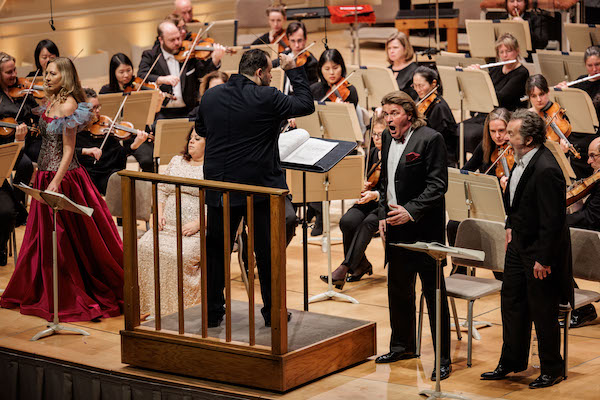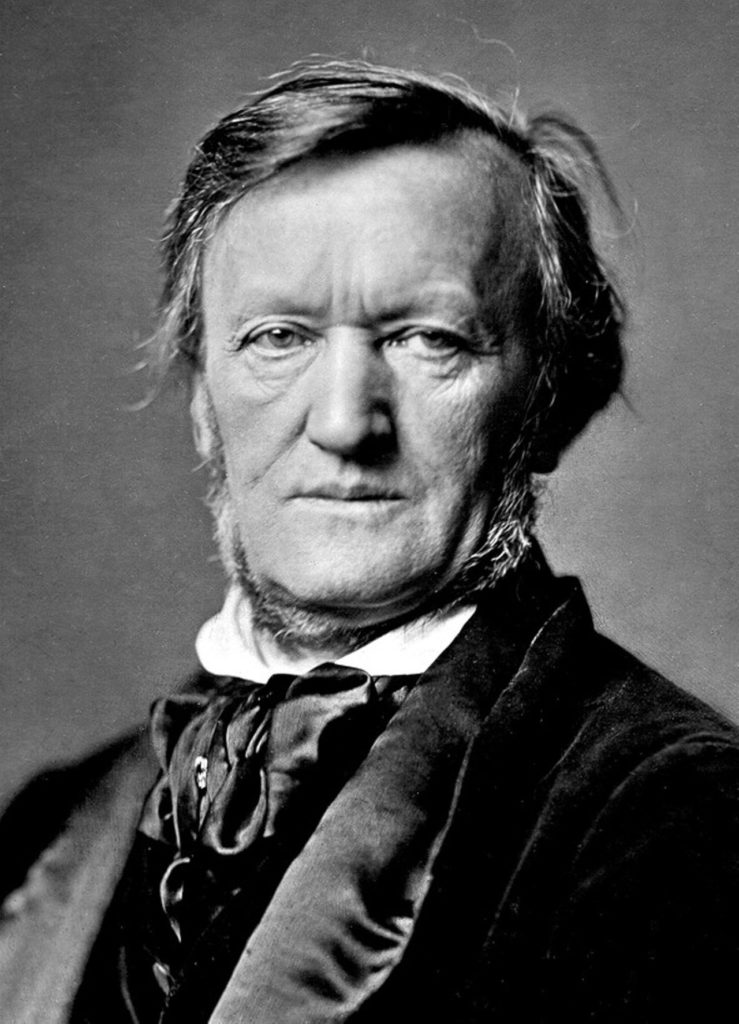Gerhaher’s Wolfram shines brightest in Boston Symphony’s “Tannhäuser”

Andris Nelsons conducted selections from Wagner’s Tannhäuser Thursday night with soloists (from left) Marina Prudenskaya, Amber Wagner, Klaus Florian Vogt and Christian Gerhaher. Photo: Aram Boghosian
The Boston Symphony Orchestra might not be the first ensemble one associates with the music of Richard Wagner. Yet the ensemble has a long history with the German composer and recent forays into his stage works have reliably delivered vocal fireworks and musical insights.
That trend continued Thursday night, when music director Andris Nelsons led the BSO, Tanglewood Festival Chorus, and soloists in a concert performance of excerpts from Tannhäuser at Symphony Hall.
Premiered in 1845, Tannhäuser is at once Wagner’s most accessible and tuneful mature opera as well as, perhaps, his most compositionally convoluted. The composer was never happy with the score, revising it incessantly, and noting three weeks before his death in 1883 that he “still owed the world Tannhäuser.” Be that as it may, what he left us is none too shabby.
The opera’s plot follows the eponymous minstrel who, after years of enjoying the carnal delights of the realm of the goddess, Venus, asks to be released. She grudgingly accedes to his request and Tannhäuser soon finds himself in a singing contest, competing for the hand of his earthly beloved, Elisabeth. In the course of this competition, our hero’s sordid past comes to light and he’s summarily banished: only if the pope, himself, grants absolution can he return.
Accordingly, Tannhäuser joins a pilgrimage to Rome. Once there, he, alone among the faithful, isn’t forgiven. On returning, dejected, he seeks out Venus’s grotto. Just as he’s about to return to his former ways, Tannhäuser’s friend, Wolfram, invokes Elisabeth and the villainess’s spell is broken.
As Tannhäuser dies with Elisabeth’s name on his lips, a procession of pilgrims enters, proclaiming salvation: the miracle the pope had requested for Tannhäuser’s exculpation —that his staff sprout shoots—has come to pass, thanks to Elisabeth’s self-sacrificing death.
All the key elements of Wagnerian drama—love, death, the redemption of a deeply flawed man by the sacrifice of a pure, noble woman—are here, along with some of Wagner’s most enduring and popular music. On Thursday, we heard about half of it: the Overture and Bacchanale from Act 1 and all of Act 3, both in the composer’s 1875 revision.
Nelsons can be frustratingly literal with symphonic fare but is often on surer footing when it comes to opera. Even so, despite the BSO’s rich tonal blend, last night’s approach to the lyrical sections in the music from Act 1 felt unduly broad. Sometimes hovering on the side of ponderousness but often dipping into it, the playing was at once micromanaged (the phrases of the Pilgrims’ Hymn) and lacking tension (the closing pages unspooled with the sensuous charge of a languid, late-summer afternoon).
At the same time, Nelsons’ take on the Bacchanale proper was the picture of color, urgency, and spirit. Here, the BSO played with a rare lightness of touch and sense of abandon. Guest concertmaster Elita Kang’s solo duet with assistant concertmaster Alexander Velinzon was among this section’s visceral highlights.
While there was more spaciousness to be had in the scene-changing orchestral episodes of Act 3, here the splendid vocal contributions tended to focus the attention.
Indeed, rarely does the supporting character, Wolfram, steal the show. Yet on Thursday the part was sung with such conviction and vigor by baritone Christian Gerhaher that he emerged the center of the tale’s action. One of the finest vocalists before the public today, Gerhaher’s singing never failed to impress for warmth, clarity, or evenness of projection.
What’s more, his silvery tone, faultless diction, and utter control (Gerhaher’s pure-toned appoggiaturas were a thing unto themselves) all served to mine the emotional complexities of this character, who, as the confidante of both Elisabeth and Tannhäuser, holds many of the story’s threads in his hands. Such was the focus of Gerhaher’s performance that even the night’s most questionable interpretive choice —the egregiously drawn-out second half of the celebrated aria, “Wie Todesahnung”—convinced at least one skeptic.
So did Klaus Florian Vogt’s account of the title role. While the tenor’s voice is a shade lighter and more boyish than one might expect for a world-weary sinner, Vogt has all the notes easily in hand. His projection in and shaping of “Inbrunst im Herzen” was particularly compelling, especially its ringing, chilling peroration.
Soprano Amber Wagner’s Elisabeth stood out for the blend of power and warmth she brought to “Almächt’ge Jungfrau.” While Marina Prudenskaya’s bright-toned Venus sounded a touch breathless in her short appearance, she navigated the notes securely.
Meantime, the Tanglewood Festival Chorus as prepared by James Burton acquitted itself admirably. For diction, blend, color, and dynamic range, one could hardly have asked for more. True, there was no boys’ choir to lead the masses into the final chorus. But the ladies of the TFC dispatched that part with such purity and deftness that one hardly minded the omission.
The program will be repeated 8 p.m. Saturday at Symphony Hall. bso.org
Posted in Performances





Posted Feb 05, 2023 at 12:05 pm by John L
What a rare treat! Tannhauser isn’t often performed in general and even less so in the US. At least partially due to the fact that there aren’t many tenors who can sing Tannhauser around. When was it last performed at the Metropolitan Opera, with Botha? Glad that Nelsons and the BSO brought a bit of Tannhauser to Boston.